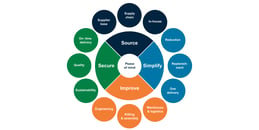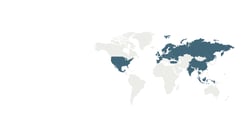- Insights
- The Solutionists Hub
- Human rights due diligence: Is your supply chain under control?
Human rights due diligence: Is your supply chain under control?

When thinking about sustainability, most people focus on the environment. But environmental sustainability is just one building block. Economic sustainability is also important, but paying attention to social sustainability is essential for companies that aim to boost their brand and avoid damaging their reputation.
There are many regulations in place designed to protect and promote the wellbeing and rights of communities and individuals from unsustainable and unethical business practices, and they play a big role in your social sustainability work. The process of adapting and complying with these regulations is known as human rights due diligence (HRDD) and has a major effect on the value chains of manufacturing companies like yours.
Many of these regulations rest on the same fundamental principles of human rights and labour standards – but the number of regulations and the way they vary in different jurisdictions makes HRDD work in the supply chain highly complex and challenging, even for large companies with extensive resources and HRDD experience.
Companies that want to become sustainable need to be aware of these regulations and incorporate them into their businesses. Even if it’s a challenging task, it’s essential for achieving social sustainability. These are just a few of the regulations that compliant manufacturers need to be aware of today:
- The OECD Guidelines for Multinational Enterprises (OECD MNE Guidelines) – Although non-binding, the OECD’s MNE Guidelines are widely accepted and promoted by National Contact Point (NCP) organisations in the countries that follow the guidelines. They cover a wide range of business best practices around human rights, competition, bribery, industrial relations and more.
- The UN Guiding Principles on Business and Human Rights (UNGPs) – These principles are also not binding, although there have been discussions on how they could become legally enforceable. Despite this, the UNGPs are widely accepted and provide a standard for how multinational companies can avoid the risk of breaching human rights and how business-related human rights abuses can be remedied.
- The Declaration of the International Labour Organisation on Fundamental Principles and Rights at Work – This declaration was made in 1998 by the ILO, a UN organisation of 187 member states. It lays down some core conventions related to workers’ rights – such as the freedom to unionise and the abolition of forced labour, child labour and discrimination at work.
- The International Bill of Human Rights – A highly influential UN resolution that created the well-known Universal Declaration of Human Rights.
If your company is building a fully sustainable supply chain, there’s a few questions you need to be asking to ensure the social sustainability aspect is covered.

What is human rights due diligence?
HRDD is a way for companies to proactively manage adverse impacts related to human rights in a proactive way. The expectation on extensive due diligence is growing because of increased accountability and transparency requirements from regulators and stakeholders. Most HRDD regulations are based on UN and OECD guidelines, and the standards stipulate a risk-based approach – finding the areas with the highest non-compliance risks and prioritising them.
What regulations and stakeholder expectations apply to my business?
The answer depends on the country you are operating in, the kind of customers you work with, and even the size of your company. Companies in the EU, for example, are affected by HRDD regulations related to conflict minerals, which are often linked to human rights abuses. National laws, such as Germany’s Supply Chain Act, will also apply in certain markets. But other stakeholders, such as shareholders and customers, can have their own demands.
What are the risks involved?
Violating these human rights regulations can have serious consequences for companies, both legally and reputationally. The exact consequences vary depending on the nature and severity of the violation and the jurisdiction in which the violation occurred. For example, large companies in Germany who breach the Supply Chain Act risk fines of up to two percent of their annual turnover.
What actions are Bufab taking?
- Our suppliers, and all their sub-suppliers, must comply with our Supplier Code of Conduct – which requires them to comply with the law in the country they operate in and demonstrate a commitment to responsible business practices in their policies, decisions and activities. It ensures social sustainability with demands on full human rights compliance, anti-corruption, health and safety and fair competitive practices.
- In line with the Supplier Code of Conduct, we also carry out regular supplier audits. Suppliers that don’t meet expectations get guidance on how to improve – but we reserve the right to cancel current and future orders or terminate contracts in cases of serious breaches.
Get more insights on the challenges around social sustainability in our guide to supply chain sustainability – and make sure to get in touch with an expert for guidance on how to ensure human rights compliance in your supply chain.
Get new knowledge every week!
Related
-
By Sergio BrambilaSustainability targets and KPIs to implement in the purchasing department
-
By Kadi MeriväljaC-Parts Purchasing: Handling Your Sustainable Purchasing Policy
-
By Patrik Lundström TörnquistSustainability Challenges With C-Parts, and How to Manage Them
-
By Carina LööfSustainable C-Parts: What You Need to Know
-
By Niklas LindsköldCBAM: How will it affect European manufacturers?
-
By Niklas LindsköldChemical compliance: What manufacturing companies need to know
-
By Niklas LindsköldConflict minerals: How to avoid them in your manufacturing operation








